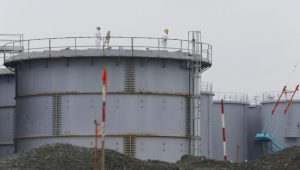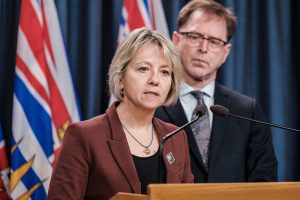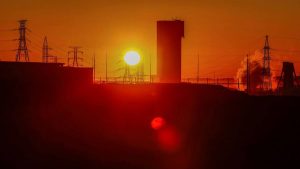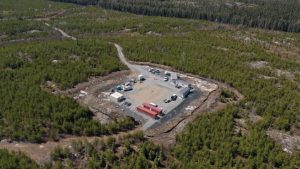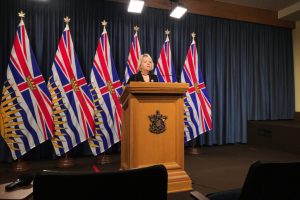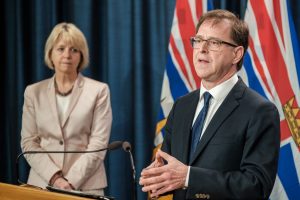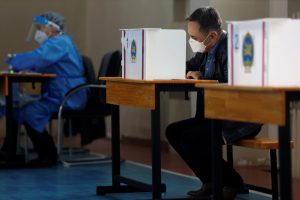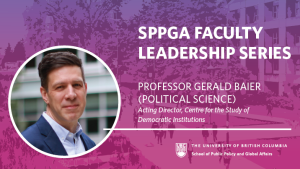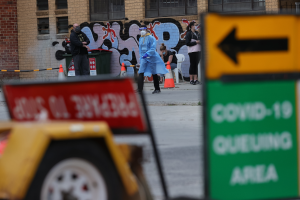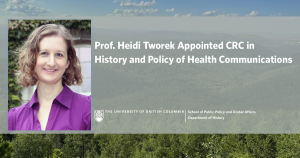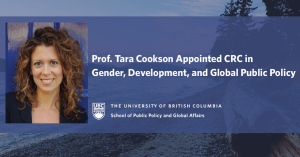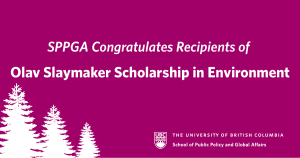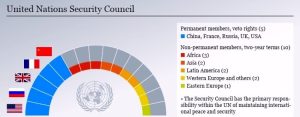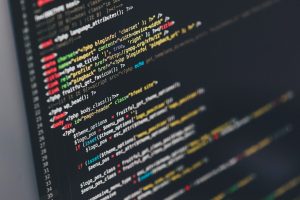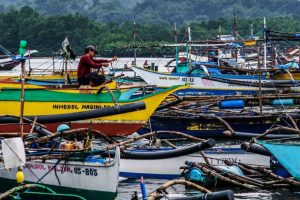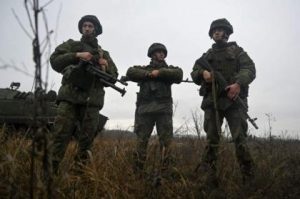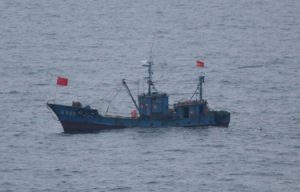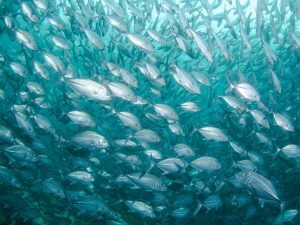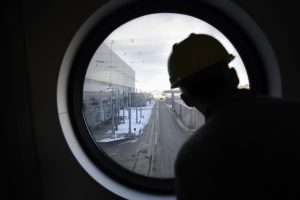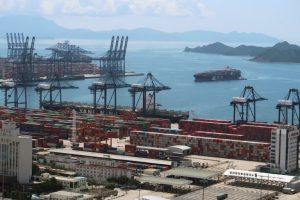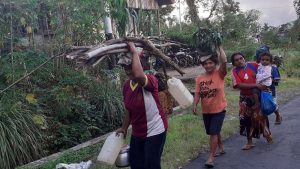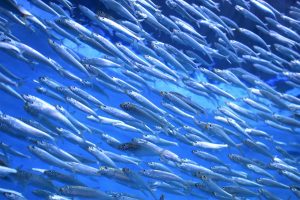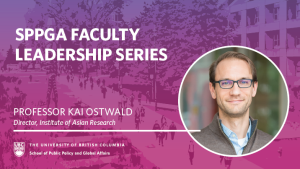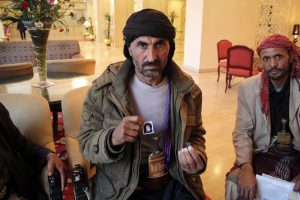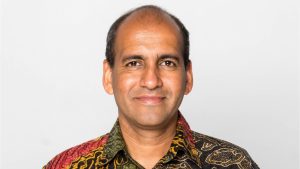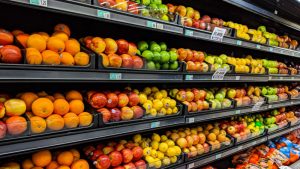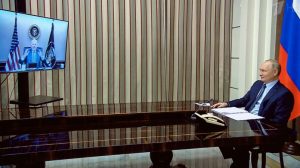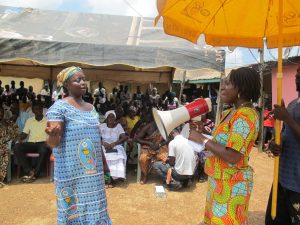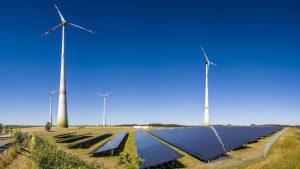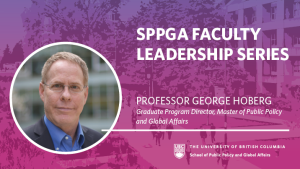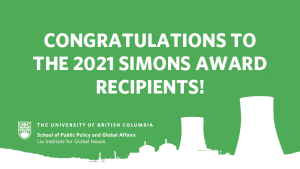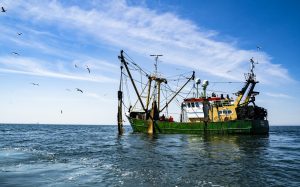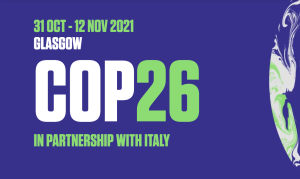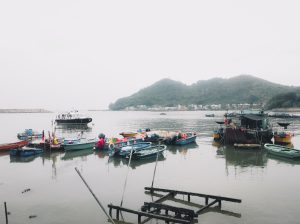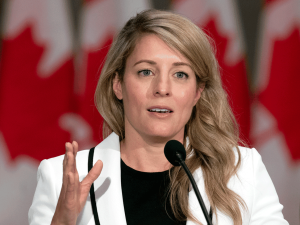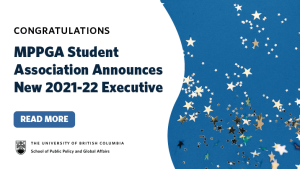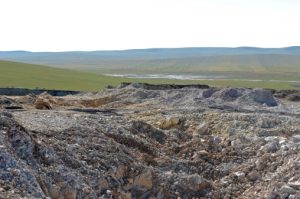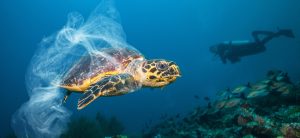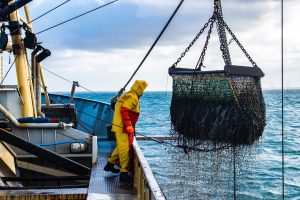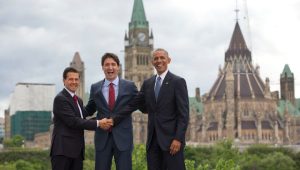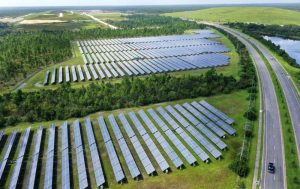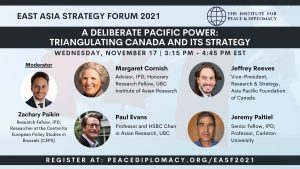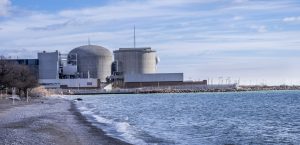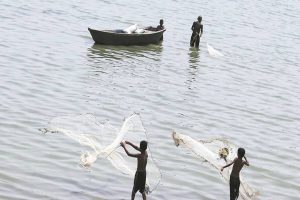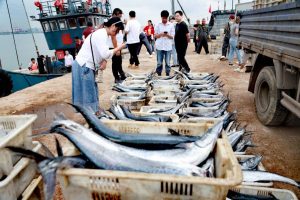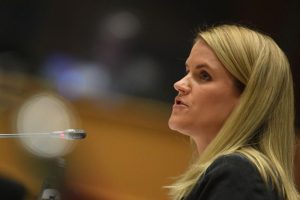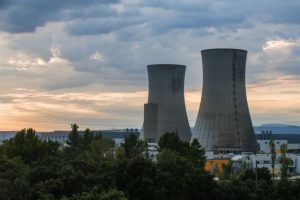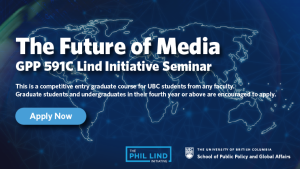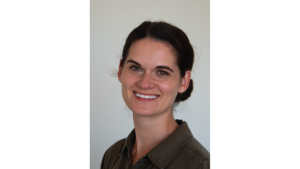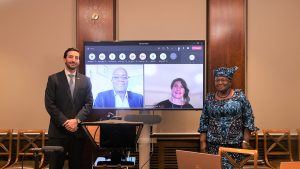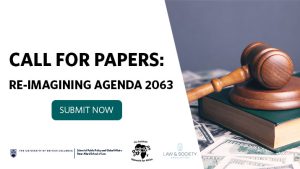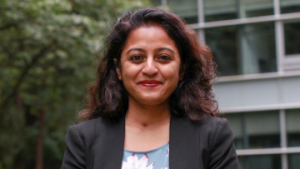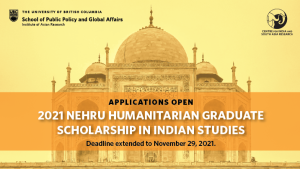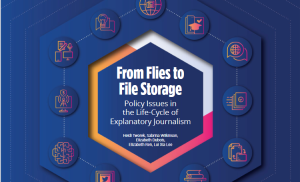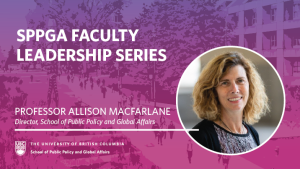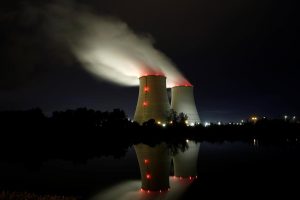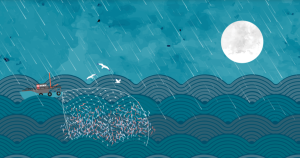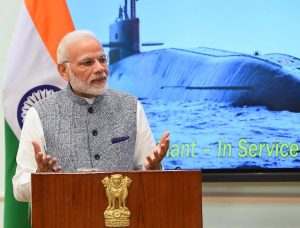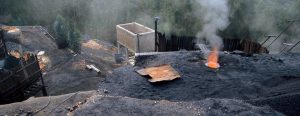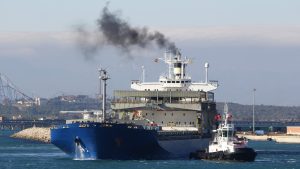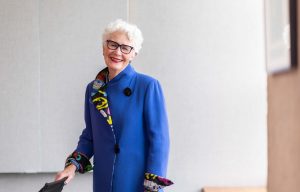MPPGA student Panthea Pourmalek Co-Publishes Paper on the Missing Global Governance Capacity Around AI Acceleration with Prof. Yves Tiberghien
Yves Tiberghien, SPPGA Faculty Associate and Political Science Professor, co-published this paper with Honours graduates Panthea Pourmalek (MPPGA student) and Danielle Luo, evaluating the governance gap surrounding digital and AI acceleration.
Could Nuclear Power Help B.C. Reach Its Climate Change Goals? SFU Research Makes the Case
Professor M. V. Ramana discusses whether nuclear power could be the solution for B.C. to reach its climate goal of net zero carbon emissions by 2050.
BC Is Creating Confusion with COVID Communications, Say Critics
Professor Heidi Tworek (SPPGA; History) warns that the inconsistency and lack of transparency around recent BC public health policies regarding COVID-19 might confuse the public.
Rio Tinto To Push Ahead with Mongolian Copper Project
Professor Julian Dierkes shares his thoughts on Rio Tinto’s plan to sign a contract with the Mongolian government for the expansion of the Oyu Tolgoi copper mine (Subscription).
The Plan to Turn My Hometown into A Nuclear Waste Dump
SPPGA Director and Professor Allison Macfarlane shares her insight on whether Canada will have found a home, and a permanent solution, for the country’s nuclear waste by 2023.
‘People Are Quite Distressed’: COVID Communications Causing Confusion in B.C.
Professor Heidi Tworek (SPPGA; History) comments on what measures should be taken to clear confusion surrounding changing Covid-19 protocols in B.C.
B.C. Public Health Miscommunications Can Lead to Mistrust, Says Expert Heidi Tworek
Professor Heidi Tworek (SPPGA; History) discusses how communication missteps during the ongoing COVID-19 pandemic has led to distrust in health experts in the province and globally.
Is the Media Doomed?
To celebrate POLITICO’s 15th birthday, Professor Heidi Tworek (SPPGA; History) presents her forecast for the American media landscape 15 years from now.
Time for Transparency from Digital Platforms, But What Does That Really Mean?
Professor Heidi Tworek (SPPGA; History) co-authors an article on the current transparency legislation, the implications of transparency mandates and what transparency reporting by media platforms entails.
How We Might Finally Get Over Our Fear of Nuclear Power
SPPGA Director and Professor Allison Macfarlane shares her thoughts on how small modular reactors will play a role in the future of nuclear power.
Collapsing Distance: Recognition, Relation, and the Power of Naming in Ethnographic Research
Professor Sara Shneiderman (SPPGA; Anthropology) reflects upon the potential unintended consequences of pseudonyms in practice, in relation to three different ethnographic contexts.
Ontario Power Is Irresponsible to Consider Another Nuclear Reactor
Professor M. V. Ramana co-authored this piece about why the environmental and public risks of Ontario constructing another nuclear reactor are too high and will detract from mitigating climate change.
Another Pandemic Year, Another Election for Mongolia
In his authored article, Professor Julian Dierkes examines the results of Mongolia’s 2021 presidential election and the challenges the country will face amidst the ongoing pandemic.
Small Modular Reactors Offer No Hope for Nuclear Energy
Professor M. V. Ramana discusses why small modular reactors offer no hope for nuclear energy, and how continued government pursuit may jeopardize attempts to mitigate climate change.
Climate Negotiations Take Tentative Steps to Phase Out Fossil Fuel Production
Professor Philippe Le Billon (SPPGA; Geography) shares why climate meetings need to discuss fossil fuels, and why incentives are needed to accelerate its decline.
Meet Our SPPGA Directors – Professor Gerald Baier
In our SPPGA Faculty Leadership series, meet Dr. Gerald Baier, Acting Director of the Centre for the Study of Democratic Institutions (CSDI) at the School of Public Policy and Global Affairs (SPPGA), and Associate Professor in the Department of Political Science and Faculty Associate of SPPGA at the University of British Columbia. In an interview […]
As Omicron Surged, So Did Abuse of Health Communicators Online
Professor Heidi Tworek (SPPGA; History) discusses the escalating issue of online and in-person harassment of health communicators during the ongoing COVID-19 pandemic.
The Inaccessible Archive
Using an autobiographical narrative, Professor M. V. Ramana writes this essay offering a glimpse of the challenges posed by secrecy to democratic debate of India’s nuclear policy.
Survey on Gender Equality at Home
Professor Tara Cookson worked to create this survey researching COVID-19’s impact on gender norms, unpaid and household care, and access and agency.
Prof. Heidi Tworek Awarded Canada Research Chair in History and Policy of Health Communications
Associate Professor Heidi Tworek (SPPGA; History) has been appointed as a Tier 2 Canada Research Chair in History and Policy of Health Communications.
Prof. Tara Cookson Awarded Canada Research Chair in Gender, Development, and Global Public Policy
SPPGA Assistant Professor Tara Cookson has been appointed as a Tier 2 Canada Research Chair in Gender, Development, and Global Public Policy.
Summary of Amicus Briefs by Prof. Erin Baines in the Case of The Prosecutor vs Dominic Ongwen
Read a summary of two Amicus Briefs in the case of The Prosecutor vs Dominic Ongwen at the International Criminal Court by Prof. Erin Baines.
SPPGA Welcomes Dr. Jessica DiCarlo, Chevalier Postdoctoral Research Fellow
We welcome Dr. Jessica DiCarlo as Chevalier Postdoctoral Research Fellow in Transportation and Development in China.
SPPGA Announces Olav Slaymaker Scholarship in Environment Recipients
Congratulations to UBC graduate students Prerna Gupta and Alice Guimaraes who are recipients of the 2022 Olav Slaymaker Scholarship in Environment.
World’s Major Nuclear Powers Pledge to Avoid Wars—Even as They Continue to Upgrade Their Arsenals
Professor M. V. Ramana discusses how, despite the world’s five major nuclear powers pledging to prevent nuclear wars, the countries continue to upgrade and enhance existing nuclear arsenals.
“India” in Assuring Destruction Forever: 2022 Edition
SPPGA Professor M.V. Ramana co-authors a chapter in the Assuring Destruction Forever report about the nuclear weapon modernisation plans and programmes in India.
Existential Gap: Digital/AI Acceleration and the Missing Global Governance Capacity
Faculty Associate Yves Tiberghien, MPPGA student Panthea Pourmalek, and Danielle Luo co-authored this paper discussing the growing gap between disruptive technology and the human capacity to manage it.
Putting Gender Equality at The Centre of Social Protection Strategies in Sub-Saharan Africa: How Far Have We Come?
Professor Tara Cookson co-authors a UN Women policy brief assessing the presence of gender equality and women empowerment considerations in national social protection strategies across sub-Saharan Africa.
Overfishing Fuels South China Sea Tensions, Risks Armed Conflict, Researcher Says
Professor Rashid Sumaila (SPPGA; IOF) discusses how a collapse in the fishing industry caused by overfishing and climate change could fuel major tensions and armed conflict in the South China Sea.
US Will Not Agree to All Russian Security Proposals, Compromise Possible
While it is expected that the United States will not agree to all of Russia’s security proposals, especially regarding NATO expansion, Professor M. V. Ramana shares why it is possible for the two sides to reach a compromise.
Scientists Warn of Fisheries Collapse in East and South China Sea
Professor Rashid Sumaila (SPPGA; IOF) shares why it is necessary to take immediate action to reduce fishing effort in the East and South China Sea, warning that regional fishing economies are at risk of collapse.
Workers or Warriors? Resident Doctors’ Protests and Health Governance in India
Even before COVID-19, protests by health workers in India were on the rise. Professor Veena Sriram (SPPGA; SPPH) writes about how the protests are a culmination of long-simmering problems in the governance of health policy in India.
The Blue Hour with Rashid Sumaila on Fisheries and Economies
Professor Rashid Sumaila (SPPGA; IOF) discusses the significance of oceans to humans and the need to find creative means to protect them.
Canada’s First New Nuclear Reactor in Decades Is an American Design. Will It Prompt a Rethink of Government Support?
Professor M. V. Ramana shares why the use of an American design for Canada’s first new nuclear reactor is a bad sign for the Canadian nuclear industry, and why it may be cause for the government to rethink its support for SMR developers.
China Looms Behind Regional Trade Agreements
Professor Kristen Hopewell discusses how China’s growing participation in bilateral and mega-regional trade agreements will accelerate the shift in global economic power from the United States and Europe to China.
Three SPPGA Faculty Members Awarded SSHRC Grants
Three SPPGA faculty, Professors Tara Cookson, Kristen Hopewell, and Heidi Tworek (SPPGA; History have been awarded funding as part of the Insite Development Grants and Partnership Engage Grants competition, offered by the SSHRC.
La Rapide Modernisation Du Japon Durant L’ère Meiji
Professor Yves Tiberghien (SPPGA Faculty Associate; Political Science) speaks about the Meiji era, and how Japan was able to rapidly move from the era of shoguns and samurai to that of modern powers in just over 30 years. (Podcast in French)
Fight Against COVID-19 Should Take Gender Equality into Account
As more COVID-19 variants emerge, public health measures remain the top concern of countries worldwide in their attempt to curb the spread of the virus. Professor Tara Cookson discusses how women are adversely affected by restricted human mobility.
The Difficult Balance Between Sea Conservation and Fishing Exploitation
Professor Rashid Sumaila (SPPGA; IOF) and other experts express concerns about global fisheries’ risk of facing economic collapse due to overfishing.
China Revives Abandoned HTGR Nuclear Technology in Safe Power Drive
As China plans to connect high-temperature gas-cooled reactors to the grid, Professor M.V. Ramana warns that accidents may arise from the technology.
Meet Our SPPGA Directors – Professor Kai Ostwald
In this interview with SPPGA, Professor and Director of the Institute of Asian Research Kai Ostwald sits down to talk with us about his expertise in development, public policy, and ethnic politics with a strong focus is Southeast Asia, and his leadership of the Institute of Asian Research.
The Mysterious Case of Joe Biden and the Future of Drone Wars
Professor Hugh Gusterson (SPPGA; Anthropology) discusses how withdrawal from Afghanistan has played a role in the reported number of U.S. drone strikes plummeting under the Biden administration.
Shunned after Fukushima, Nuclear Industry Hopes Smaller Reactors Can Play Role in Energy Transition
While proponents claim small nuclear reactors are safe, many, including Professor Ramana, understand that “nuclear fission is inherently dangerous and it’s difficult to judge the safety of reactors that haven’t been licensed or produced yet.”
B.C. Food Prices in 2022 Forecast to be Above Already-High National Average
With the release of a news report detailing the 2022 national forecast for food prices, Professor Matias Margulis (SPPGA; LFS) examines why B.C. prices are estimated to be above the already high national average.
Ukraine Tensions Remain High After Putin-Biden Talk as Neither Side Likely to Give Ground
Professor M.V. Ramana warns about the rising tension between the USA and Russia over Russia’s alleged plans to invade Ukraine.
History Explains Why Global Content Moderation Cannot Work
Professor Heidi Tworek (SPPGA; History) analyzes the history of speech moderation and shares why social media platforms generating standards for acceptable speech is an all but impossible challenge.
Canada’s Year of Action on Democracy
Professor Maxwell Cameron (SPPGA; Political Science) co-authors this article discussing reasons why now may be the time for the Canadian government to fulfill commitments to democratic development.
Three Myths About Renewable Energy and the Grid, Debunked
Professor M. V Ramana co-authors this article debunking myths surrounding renewable energy, and the argument that solar cannot be the foundation of a dependable electricity grid.
Don’t Ignore Democracy’s Flaws
Approaching Biden’s Summit for Democracy and the Ninth Summit of the Americas, Professor Max Cameron (Former SPPGA Acting Director; Political Science) proposes three key steps to strengthen democracy.
You’ll See More Carbon Labels in the Grocery Store Next Year. Here’s What They Mean.
Professor Navin Ramankutty (SPPGA; IRES) discusses the best ways to approach climate solutions, and whether attaching carbon labels to products at the grocery store is an effective method.
A Nuclear-Weapons-Free-Zone in the Middle East— & the Elephant in the Room
After nations gathered to discuss establishing a nuclear-weapon-free zones in the Middle East, Professor Ramana reasons that such a zone will be a major challenge largely due to policies around Israel’s nuclear weapons program.
Reflections from Yale-UBC Fox International Fellow Jory Smallenberg
Jory Smallenberg reflects on her time as a fellow in the Yale-UBC Fox International Fellowship, hosted by the School of Public Policy and Global Affairs at the University of British Columbia.
In Pandemic Communications, the Learning Curve Is Strangely Absent
Looking back at the last twenty months, our understanding of Covid has increased exponentially, yet pandemic communications have changed far less than we hoped. Professor Heidi Tworek (SPPGA; History) explores the idea of mütend, or helpless frustration, that many feel at this time.
Meet Our SPPGA Directors – Professor George Hoberg
In our SPPGA Faculty Leadership series, meet Dr. George Hoberg, Professor with the School of Public Policy and Global Affairs (SPPGA) and Graduate Program Director of the professional Master of Public Policy and Global Affairs (MPPGA) program at the University of British Columbia. In an interview with SPPGA, Professor Hoberg shares what drives his research, […]
Congratulations to the 2021 Simons Award Recipients!
Congratulations to the seven UBC students who are the recipients of the 2021 Simons Award, selected by the Liu Institute for Global Issues in the UBC School of Public Policy and Global Affairs.
Ocean Sustainability for All Requires Deeper Behavioural Research
This article co-authored by Professor Philippe Le Billon (SPPGA; Geography) discusses how behavioural science can enhance ocean sustainability by providing insights into illegal fishing.
Why I Attended COP26 – MPPGA Alum Denby McDonnell
Denby McDonnell, a Master of Public Policy and Global Affairs alumni, participated in the 26th UN Climate Change Conference of the Parties (COP26) on behalf of her employer, Ecotrust Canada. Learn about her key takeaways in this interview.
Primary Care Physician Involvement During Hospitalisation: A Qualitative Analysis of Perspectives from Frequently Hospitalised Patients
Professor Veena Sriram (SPPGA; SPPH) co-authored a study that examines frequently hospitalised patients’ preferences and experiences regarding primary care physician (PCP) involvement during hospitalisation.
SPPGA Engages with COP26
Several members of the SPPGA community and faculty speak on their participation or share their expertise on the 26th UN Climate Change Conference of the Parties (COP26).
Key Takeaways from COP26 – Professor Rashid Sumaila
We spoke with Professor Rashid Sumaila (SPPGA; IOF) about his participation in the 26th UN Climate Change Conference of the Parties (COP26) and his key takeaways.
All About Money with UBC’s Rashid Sumaila – Part 2
In part two of this interview with Hong Kong International Business Channel, Professor Rashid Sumaila (SPPGA; IOF) discusses Hong Kong’s role in the fishing industry as a ‘disproportionately’ large consumer.
Modular Nuclear Reactors a ‘Long Shot’ Worth Studying, Says Yukon Gov’t
Professor M.V. Ramana argues that small modular reactors (SMRs) are not a practical and realistic approach to reducing emissions for Yukon and the rest of Canada.
All About Money with UBC’s Rashid Sumaila
In a discussion with Hong Kong International Business Channel, Professor Rashid Sumaila (SPPGA; IOF) examines some of the main drivers of depleting commercial fish populations, including fish farms – and how they’re in fact contributing to overfishing.
Eliminating Harmful Fishing Subsidies: Lessons from Regional Trade Agreements
Professor Rashid Sumaila (SPPGA; IOF) breaks down how eliminating harmful fishing subsidies could save the planet’s oceans and ocean economy.
The ‘Penny Has Dropped’: Liberal Government Throne Speech Signals New Direction on China, Analysts Say
Professor Paul Evans analyzes the Liberal government’s usage of the term “Indo-Pacific” in their crown speech, and what it indicates about the future direction of Canada-China relations.
MPPGA Student Association Announces New 2021-22 Executive
UBC Master of Public Policy and Global Affairs students recently appointed their 2021-22 Student Association executive members and set forth their strategic vision for this academic year.
Local Procurement, Shared Value, and Sustainable Development: A Case Study from the Mining Sector in Mongolia
Professor Nadja Kunz (SPPGA; Norman B Keevil Institute of Mining Engineering) co-authors this article examining a case study in Mongolia to see the challenges confronting mining, traditional livelihoods, and sustainable development.
Instead of Shopping This Black Friday, Consider Curbing Your Consumption
As Black Friday kicks off the holiday shopping season, Professor Rashid Sumaila (SPPGA; UBC Oceans) urges consumers to make the connection between what they buy and what eventually ends up harming our ecosystems—and our health.
Report Shares Good and Bad News for Canada’s Fisheries
Professor Rashid Sumaila (SPPGA; IOF) discusses the need for Fisheries and Oceans Canada to implement new fishing regulations to conserve and rebuild depleting fish stocks with Global News Canada.
What To Watch for as Biden, Trudeau, López Obrador Tackle Immigration, Supply Chain
With North American leaders, Biden, Trudeau, and López Obrador planning to meet face-to-face for the first time in four years, Professor Kristen Hopewell discusses regional friction over issues such as trade and immigration.
Nuclear Power and America’s Clean Energy Future
With US government funding lined up to put shovels in the ground for new nuclear test plants, SPPGA Director and Professor Allison Macfarlane discusses uncertainties surrounding the promise of nuclear power.
A Deliberate Pacific Power: Triangulating Canada and Its Strategy
In this virtual event, Professor Paul Evans was featured as a panellist to discuss the political and economic goalposts that anchor Ottawa’s strategy in East Asia and the Pacific, how it has or has not defined the means for achieving them, and where the demand is, if any, for Canada to step up and articulate its relevance.
Should Nuclear Have a Place in Canada’s Climate Strategy?
As Canada commits to new climate targets following COP26, Professor M. V. Ramana argues that Canada should focus on renewables, rather than nuclear energy sources as the answer for both climate and post-COVID economic woes.
Why I Attended COP26 and What I Learnt – Temitope Onifade
The 26th UN Climate Change Conference of the Parties (COP26) in Glasgow has recently concluded. Temitope Onifade, PhD candidate at the Allard School of Law and Co-chair of the Liu Institute Network for Africa at the Liu Institute for Global Issues, UBC School of Public Policy and Global Affairs, University of British Columbia participated as […]
Fishery Subsidy: India to Seek Fairer Deal at WTO
As India is pushing for a fair fishery subsidy deal at the WTO, this article shares a study led by Professor Rashid Sumaila (SPPGA; UBC Oceans) showing that the subsidy in India is billions of dollars lower than other countries.
Plenty of Fish in the Ocean? Not so Around China, Says Study Warning of Seafood Collapse
Fish stocks in the South China Sea are at risk of collapse if action is not taken in the next 10 years to reduce overfishing and the effects of climate change. Professor Rashid Sumaila (SPPGA; UBC Oceans) states that it is important to enforce sustainable fishing practices so that fisheries can continue to feed and nourish us.
Leaked Facebook Document Shows How Often the Company Restores Posts — And How the Rates Change Depending on Where You Live
With internal Facebook documents being leaked, Professor Heidi Tworek (SPPGA; History) examines why the appeal rate for post removal varies widely depending on where you live.
Is Nuclear Power the Way Forward to Combat the Climate Crisis?
As the United Nations Climate Change Conference wraps up, SPPGA Director and Professor Allison Macfarlane states that there is a definite need to move away from fossil fuels, and that nuclear power could potentially be the way forward.
For Local Fishers to Compete, African Leaders Must Urge WTO Members to End Harmful Subsidies
Professor Rashid Sumaila (SPPGA & UBC Oceans) co-authors an article looking at harmful fisheries subsidies and threats to Africa’s fish stocks.
The 2022 Budget Reading Is Coming Up: Three New Things I Want to See in the Budget
MPPGA alumnus Solomon Atta points out three things he would like to see from Ghana’s upcoming Budget Statement and Economic Policy reading.
Xi Jinping Is in a Good Position to Break Norms and Continue to Lead China
Professor Timothy Cheek (SPPGA; History) speaks on China’s Communist Party passing a historic resolution that will allow leader Xi Jinping to lead for an unprecedented third term.
GPP 591C Lind Initiative Seminar
Applications to GPP 591C Lind Initiative Seminar: The Future of Media are now open to UBC graduate students and undergraduates in their fourth year or above from any faculty. The course forms part of the 2022 Phil Lind Initiative series, with visits from some of the world’s leading intellectuals on media. Apply by Nov. 30th, 2021.
The Good, the Bad and the Incongruous at the Rome G20
Professor Yves Tiberghien (SPPGA Faculty Associate; Political Science) discusses how the G20 disappointed at the Rome Summit, through failing to massively accelerate COVID-19 vaccine distributions or to generate critical acceleration to solve the climate emergency.
Mongolia and Kyrgyzstan Struggle with the Curse of Mineral Wealth
Professor Julian Dierkes comments on the daunting challenges facing Mongolia and Kyrgyzstan’s mining industry. (Subscription)
SPPGA Welcomes Zoe Braden, Postdoctoral Research Fellow
We welcome Dr. Zoe Braden as a Postdoctoral Research Fellow working with Director and Professor Allison Macfarlane. Zoe will be examining Canada’s nuclear waste repository site selection.
Scientists Urging Members to Reach MC12 Fishing Subsidies Agreement Present Letter to DG Okonjo-Iweala
As a lead co-author, Professor Rashid Sumaila (SPPGA; UBC Oceans) presented a letter calling for the WTO to curb harmful fisheries subsidies to Director-General Okonjo-Iweala on behalf of nearly 400 ocean experts.
Global Meeting on Law and Society: Call for Papers for “Re-Imagining Agenda 2063”
The “Re-imagining Agenda 2063” International Research Collaborative (IRC) of the Law and Society Association (LSA) invites you to submit an abstract for presentation at the Global Meeting on Law and Society to be held from 13 to 16 July 2022 at Lisbon, Portugal. The IRC plans to have in-person and virtual panels at the conference. […]
Power Analysis in Health Policy and Systems Research: A Guide to Research Conceptualisation
Research by Professor Veena Sriram (SPPGA; SPPH) and others illuminate how power shapes health policy and systems and is critical to identifying underlying factors driving health disparities, systems challenges and inequities.
Applications due for 2021 Nehru Humanitarian Graduate Scholarship in Indian Studies
The Centre for India and South Asia Research (CISAR) at The University of British Columbia, invites submissions for the 2021 Nehru Humanitarian Graduate Scholarship in Indian Studies.
From Flies to File Storage: Policy Issues in the Life-Cycle of Explanatory Journalism
Professor Heidi Tworek (SPPGA; History) co-authors a report based on multi-disciplinary and multi-lingual research about the production, distribution, and impact of explanatory journalism in Canada.
Meet our SPPGA Directors – Professor and Director Allison Macfarlane
In our SPPGA Faculty Leadership series, meet Dr. Allison Macfarlane, Professor and Director of the School of Public Policy and Global Affairs, who outlines her background and current research, her vision for the school, and the ways that students, faculty, and policymakers can engage with our work.
Going Nuclear on Climate Change
Director Allison Macfarlane enters the debate over the role of nuclear power in achieving net zero carbon emissions (Subscription).
SPPGA Welcomes Hanna Karg, Postdoctoral Research Fellow
We welcome Dr. Hanna Karg as a Postdoctoral Research Fellow working with Professor Navin Ramankutty. Her research interests include urban food systems, land use change, and cross-border food trade.
Sink or Swim: The Future of Fisheries in the East and South China Seas
Professor Rashid Sumaila (SPPGA; UBC Oceans) co-authors a report warning that Asia’s marine ecosystems are under serious threat and calls for immediate policy action.
AMS Turns Focus to Reducing Employee Carbon Emissions as Part of Net-zero Emissions Plan
Professor Milind Kandlikar (SPPGA; IRES) weighs in on the AMS plan to hit net-zero emissions and on the long-term impacts of offsetting carbon emissions.
What’s Known—and Not Known—About India’s Nuclear Weapons Budget
With India’s lack of transparency around nuclear weapon expenditures, Professor MV Ramana states that even government bureaucracies do not seem to have access to expenses relating to weapons facilities.
Joint Statement by UN human rights experts – Accelerate the end of the coal era to protect human rights
Professor David Boyd (SPPGA; IRES) makes a statement about the necessity to end the coal era in order to protect a range of human rights, including the rights to a safe, clean, healthy and sustainable environment, to life, to health, and the rights of the child and the rights of Indigenous peoples.
Tax Air Travel and Sea Shipping to Help Climate-Vulnerable Nations, UN Expert Tells COP-26 Leaders
In a message directed to world leaders gathering for COP-26, Professor David Boyd (SPPGA; IRES) states that new taxes on air travel and maritime shipping could raise the billions of dollars needed to help the countries suffering most from climate change.
Leadership One-on-One: Moura Quayle
Moura Quayle (UBC’s Vice-Provost and Associate Vice-President, Academic Affairs; SPPGA Professor and founding Director) appears in a Q&A about her leadership experience and herself for the Leadership One-on-One series.
Nuclear Industry Has High Hopes for Net-Zero Future
Professor M. V. Ramana, Professor Nadja Kunz (SPPGA, Mining Engineering), and Sarah Froese (MPPGA Alum) were quoted about the future of nuclear power.

